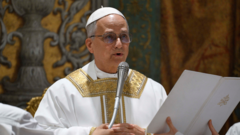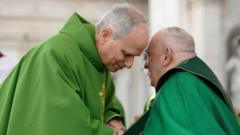With Pope Francis’ tenure ending, the Catholic Church stands at a crucial juncture. The cardinals tasked with selecting the next pope are faced with a vital choice: either continue the more inclusive and global approach championed by Francis or revert to the traditional conservatism of his predecessors. Francis leaves a complex legacy shrouded in both hope and controversy. While there were initial expectations of a revitalization of church attendance, particularly in the West, these hopes largely fell flat amidst ongoing secular trends, although growth continued in the global South. His efforts to confront the church’s sexual abuse crisis and financial problems, alongside his progressive views on controversial issues—including divorce, the role of married priests, and the acceptance of LGBTQ+ individuals—have resonated with liberal Catholics, yet critics argue that his innovations could easily be undone by a more conservative successor.
Pope Francis’ Legacy: A Pivotal Moment for the Catholic Church

Pope Francis’ Legacy: A Pivotal Moment for the Catholic Church
As Pope Francis steps away, the future direction of the Catholic Church is uncertain, presenting a significant crossroads for the cardinals who will choose his successor.
Francis’ papacy marked a departure from the paths set by Benedict XVI and John Paul II, especially concerning the church's response to abuse scandals that plagued its reputation. Notably, he made strides toward fostering dialogue and a more open environment for diverse opinions within the church’s structure. Nevertheless, his confrontations with conservative church officials highlighted his commitment to a vision of the church he believed necessary for modernity and ecclesiastical resilience. His extensive outreach efforts, particularly to Muslim leaders in regions where Christians face persecution, underscore a continuous commitment to fostering interfaith dialogue, yet the real challenge remains in reshaping the church from within. As he appointed many bishops and restructured the College of Cardinals to align with his vision focused on humanitarian efforts and environmental issues, Francis has undoubtedly left an indelible mark that will influence the church's path forward.
In conclusion, the next pope’s decision to embrace or reject Francis’ reforms will not only shape the future of the Catholic Church but will also impact its role in a rapidly changing global landscape, making the upcoming selection a pivotal moment in church history.
In conclusion, the next pope’s decision to embrace or reject Francis’ reforms will not only shape the future of the Catholic Church but will also impact its role in a rapidly changing global landscape, making the upcoming selection a pivotal moment in church history.





















